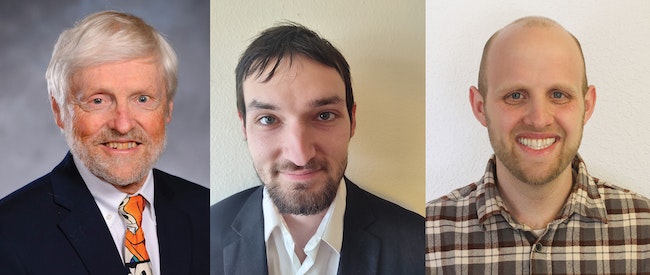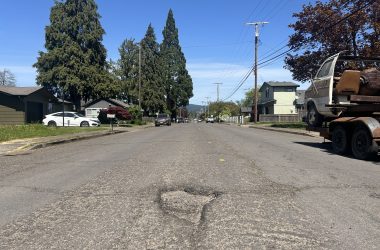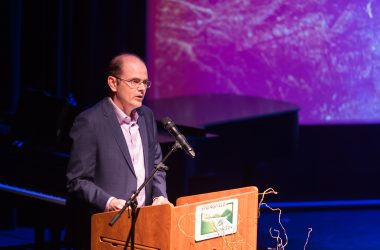 Lively, Huber & Stout
Lively, Huber & Stout
Editor’s note: With the newly drawn district lines in place, District 7 now contains the entire City of Springfield with the McKenzie River, the Middle Fork Willamette River and Interstate 5 as boundaries. The District 7 state representative seat is held by incumbent John Lively and is contested by Raiph Huber and Alan Stout.
Chronicle: What are the state’s greatest challenges in recovering from the pandemic?
Huber: I believe the greatest challenges we face are two in particular: preparation and financial and social recovery. Many families and individuals for two-plus years were forced to quarantine alone; that takes a severe mental health toll, because humans by and large are meant to be social, and a lot of families were put out of work or lost businesses as a result of the pandemic. I will aid in this by working alongside our businesses and figuring out what they need to restabilize and then work to make it happen.
Lively: The greatest challenges in recovery include support for students in our schools to make up for lost learning opportunities, support for small businesses recovery, and the need for more workers trained to work in available jobs. I supported additional funds for summer school opportunities during the last session, funding for small businesses to make up revenue losses and increased funding for training our workforce.
Stout: Our state government’s response to the pandemic caused good families, businesses and workers to leave Oregon. This stops now. Going forward, we need high-quality educational options, guaranteed personal freedoms and solid plans to deal with affordability and homelessness. I believe Springfield can lead the charge to make Oregon a truly phenomenal place to live.
Chronicle: What strategies will you pursue to mitigate an/or reduce the human impact on Oregon’s natural resources?
Huber: We need to begin incentivizing businesses and individuals to use renewable energy resources. My strategy would be to look into potential tax cuts and other financial and alternative incentives to convince the major players in this industry that it’s in their best interest to use renewable energy. Regulations are only useful to a point without a back-up plan to minimize loss of jobs for those working in these industries.
Lively: I will continue to work with all my colleagues developing further strategies for managing our forests and providing access for a wide range of activities. I will work to identify risks to our waterways and other natural resources from our activities and develop strategies to limit and/or eliminate.
Stout: Oregonians are conservation-minded in their core. Natural resources are to be stewarded well so that future generations can use and enjoy them. I want to see wisely managed forests and lands. We need less super projects that waste countless dollars and resources. Instead, we can adopt a more environmentally and economically sustainable “fix-it-first” approach.
Chronicle: What steps will you take to make mental health services more accessible and affordable for Springfield and its rural communities?
Huber: My plan to make mental health services more accessible and affordable is a two-fold plan. The first plan is to look at ways to destigmatize asking for help as a sign of weakness and more of one of strength. If we make it less stigmatizing or embarrassing to seek help people will generally take it. The second on affordability is looking at ways to increase health care coverage of treatment outside of pills and medication and more of maybe voluntary in-patients outside the state system and also regulating prices on vital treatments.
Lively: At this time, the state has committed hundreds of millions of new dollars to increase pay, hire more employees and make mental health services more accessible. I supported those efforts and will now focus on accountability to ensure we get the result we expect and/or adjust where need be.
Stout: Our state government needs to show up for people when they really need it. I want to see more collaboration between local nonprofits and the government with respect to both acute and long-term mental health care. We do not need another major government spending plan when the local organizations just need a little push to better fulfill their mission.
Chronicle: What is your strategy for breaking down barriers of low inventory and lack of affordable housing?
Huber: One major point is more and new affordable housing. Springfield has very little in terms of affordable housing and as the years go on properties managed by major companies are becoming increasingly unaffordable. I would propose a tax credit for property management companies as an incentive to keep rent prices to a minimum and encourage new complexes to be built.
Lively: Available housing that is affordable is a challenge in our state and region. The problem will not be solved in the near-term. Investing state funds to support local efforts to increase affordable housing and choices for the unhoused is a step in the right direction. Millions of state dollars are committed, but we must give the programs time to work and if not working adjust to address the unique needs of communities in Oregon.
Stout: We need more housing where people want to live. To do that, every neighborhood must have the right to build to the next level of intensity, but not further. For example, where we have mostly duplexes, we must be able to build triplexes — not monstrous housing projects. This incremental approach respects the character or the local neighborhoods and quickly results in more housing.
Chronicle: What are the key issues facing education, and what policy changes will you advocate for to better support our students and our educators?
Huber: The major issue facing education is a lack of funding. Teachers are underpaid and are still expected to devote countless hours to helping students ensure they succeed and graduate. Oregon is constantly ranked one of the lowest in terms of graduation rate and Springfield is one of the lowest in the state. We need additional funding to bring more teachers on and increase pay as a means to ensure our teachers can continue doing the vital work of educating the next generation.
Lively: At all levels of education, key issues include not enough staff to support a wide range of student and family needs, mental health challenges and always a need for stable funding to complete strategies. I support better understanding the critical needs and adjusting current spending and/or providing changes in programs to make the improvements we agree need to be made.
Stout: State policies do not support parents and educators working together. We need a ground-up approach for education that allows for teachers and parents to truly collaborate in what and how we are teaching our students. Only through a true collaboration will we create inspiring educational options that attract and keep families and allow us to rebalance how we are spending our precious education dollars.
Chronicle: What is the biggest challenge facing your District that is not often talked about? How will you bring awareness to, and address that problem?
Huber: The biggest challenge facing our District is truly underfunding and mismanagement. From my time working alongside local non-profits and meeting people in the community, I have seen the true impact of not having enough funding to ensure our community is cared for. From housing to mental health – and even assistance with utilities and similar items – our community at times is struggling to make ends meet. Being a Eugene “suburb,” a lot of times people feel we get overlooked and underserved in the state.
Lively: Biggest challenge facing this district is like many other districts outside of Portland: Influencing state policies to ensure policies are not solely focused on solving problems in Portland. One model does not fit all circumstances in our state. I will continue to work with all my colleagues to influence final legislation that better reflects this district and others throughout the state.
Stout: Food insecurity is a big issue that we are not talking about. I want to see resilient, regenerative agriculture become a part of Springfield’s daily life; this can be anywhere from simply having a garden in your backyard to hosting micro-farms in the city center. We are agricultural people and all need to know our local farmers by name.
— Compiled By Erin Tierney








